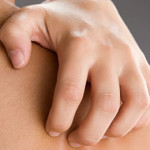Does Eczema Spread Quickly by Scratching?
The good news, eczema (a kind of chronic inflammatory skin condition) doesn’t spread to others. In other words, it is not contagious condition. But it can get worse and spread to other parts of the body. Itching of the problem can be very bothersome. Many times, the urge of scratching the affected skin is the most challenging thing!
So far, experts are still not able to explain the cause of the problem with certainty. However, many experts theorize that it may occur due to a combination of different factors such as immunological, genetic, and environmental factors.
The most common type of eczema (atopic dermatitis) is often associated with a family history or a personal history of some atopic diseases such as asthma, hay fever, allergic rhinitis, or defects in the skin barrier [1]. It seems that genetic factors may play a key role for this kind of eczema.
There is nothing you can do for genetic factors. However, there are plenty of options you can explore to prevent the flare-ups.
Since the flare-ups can be triggered by environmental factors, this can be a starting point to cope with the problem.
One of common recommendations is with a good stress management. Almost all cases of eczema can get worse with stress. Therefore many times, stress management is used in the treatment plan.
The best idea to prevent the breakouts of eczema is by keeping far away from the trigger factors. Other environmental factors that can make the problem get worse are dust mites (they are commonly found in some household items such in bedding), certain foods (such as gluten or eggs), wool, cosmetics, or exposure to too high /low temperature [2].
In addition, the trigger-factors can vary from sufferer to sufferer. For instance, while most sufferers find that the problem is not related with sun exposure, some get a worsening of the problem when they get too much exposure to the sun.
As written before, atopic dermatitis is the most common type. It can affect people at any age, but it usually starts in the childhood or during infancy. Other types are:
Contact dermatitis
As the name implies, it is a kind enzyme that can be triggered by a repeatedly direct contact to strong irritants or allergy-triggering substances (like poison ivy, cosmetics, or nickels).
Neurodermatitis
When it comes to the issue between eczema and the urge of scratching, neurodermatitis may be the most reasonable answer. However, all types of eczema usually can get worse by scratching.
 Neurodermatitis is a kind of eczema when the skin irritation usually occurs on the spots of the skin that you frequently scratch out of behavior. Typically, it affects ear (particularly behind or/and inside the ear), wrists, genital areas, ankles, scalp, around the neck (particularly back or sides of the neck), and back.
Neurodermatitis is a kind of eczema when the skin irritation usually occurs on the spots of the skin that you frequently scratch out of behavior. Typically, it affects ear (particularly behind or/and inside the ear), wrists, genital areas, ankles, scalp, around the neck (particularly back or sides of the neck), and back.
Stasis dermatitis
This type usually develops in individuals when their lower leg’s veins are poor in returning the blood from the legs to the heart.
The symptoms can arise very fast. Sometime, the symptoms can cause crusting & weeping of the skin.
Seborrheic dermatitis
This type is also familiar called as dandruff. Chest (especially center of the chest), ear (behind the ears), sides of the nose, groin, and eyebrows are some common areas of the body where that are affected by seborrheic dermatitis. In infants, it often affects the scalp of the head.
Seborrheic dermatitis is often characterized by the skin that falls off in flakes. This may be triggered by the bacterial infection (an overgrowth bacteria, a type of bacteria that naturally lives in the affected areas)!
The prognosis and outlook of seborrheic dermatitis is usually poor in people with also have other autoimmune diseases. For instance, it is more difficult to be controlled and treated in people with AIDS.
Nummular Dermatitis
Typically, it is relatively more common in men than in women. In women, the first outbreak usually occurs at early adulthood or teen years. And in men, the first outbreaks are more likely to occur at the age of 50s.
The unique symptom is the coin-shaped red marks. These marks usually affect hips, forearms, lower back, hands (especially the back of the hands), and legs.
And like other types of eczema, the exact cause is also still unclear. But there are some common factors that can trigger the flare-ups. These include exposure to too hot or too cold air, certain metals (such as nickel), or certain chemicals (such as formaldehyde).
Dyshidrotic dermatitis
Severe itching is usually the onset symptom of this type. The exact cause is also unclear, and many times it affects the feet and hands.
The itching sensation can be followed by blisters which then can be scaly patches in a few weeks later. There is a chance for this type to become chronic condition and also painful.
For many people, it’s not easy to distinguish each type of eczema as mentioned above. But qualified dermatologists do clearly understand what they can do to make a clearly diagnosis.
While it cannot spread from one people to another (non-contagious condition), there is a chance for it to spread from one area to other areas /parts of the body!
In general, some experts still believe that the problem and wrong respond of the body immune system is still the key of eczema [3].
For this reason, actually the rash of the problem doesn’t directly cause more rashes. However, scratching can worsen the problem and increase the chance of the affected area to get larger and may spread quickly to other areas.



